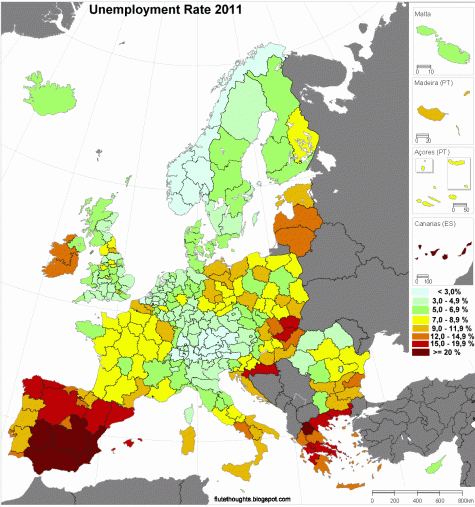Ugly Map of European Unemployment
The Swedish economics blog Flute Thoughts has posted this map of 2011 employment by region in Europe:
[I first saw this as a cross-post in Zerohedge]. This map calls attention to the differences between the “core” and “periphery”. On a country-by-country basis, usually the “core” is seen as France and Germany, maybe a few others such as the Netherlands and Austria. However, as Flute points out, northern Italy looks more like Germany than like southern Italy, and France looks somewhat “peripheral.” In general, if you speak some Germanic language (e.g. German, Dutch, English, or a Norse tongue) you are more likely to have a job. Greece and Spain are employment disaster zones, along with parts of Eastern Europe and the Baltics. It seems like the non-eurozone regions (e.g. UK, Norway, Czech Republic) are faring relatively well.
As we have described here and here, adoption of the euro has been disastrous for the peripheral countries. Before then, they had available the safety valve of currency devaluation to manage imports and exports. The propect of devaluation also tempered the willingness of foreign creditors to buy the bonds of these countries. When these peripheral countries had control of their own currencies, it was difficult to refuse the demands of workers for ever-increasing wages, since the workers knew that more money could always be printed, and indeed was expected to be printed.
One philosophical driver behind the euro was that it would impose greater financial discipline on the Mediterranean countries. The expectation was that they would restrain wage hikes and public employment and boost productivity; in short, start acting more like Germans.
This expectation was not fulfilled. The availability of euro credit at the low interest rates traditionally associated with the German mark led to a binge of government borrowing and spending in Greece, and private borrowing and homebuilding in Spain and Ireland. Also, at the time of conversion to the euro, the Greek drachma was probably valued too highly, which gave the Greeks too-high starting wages, so they bought a lot of BMWs. Now, at last, financial austerity is being imposed on the Greeks. However, it seems unlikely that Greece will ever be able to repay its external debts; many young, talented Greeks with no hope of employment at home are simply leaving the country, further tarnishing the prospects for a Greek recovery.
Meanwhile, the Germans acted like Germans, continously improving productivity and keeping labor costs under control. As a result, their labor cost of production is something like 30% lower than e.g. in Spain or Italy, even though Germans do not work longer hours. So the euro experiment has been great for Germany: using the euro rather than their own mark has kept their currency relatively weak, which has aided their export-oriented economy. Hence, jobs.
There are some factors that are unique to specific countries. In Ireland, for instance, neither the goverment nor business nor workers were profligate. Ireland suffered a housing boom and bust similar to the U.S. in 2008, which the threatened the solvency of Irish and other European banks. Rightly or wrongly, instead of just letting the banks go bust, the Irish government decided that the Irish taxpayer would backstop the banks, so the Irish goverment had to borrow billions of euros.
For the last two or three years, it has continually seemed like the eurozone was about to implode, but the Europeans have done an amazing job kicking the can down the road. In the past two years we have been treated to a long series of press conferences between German and French leaders Merkel and Sarkozy, and more recently, strident announcements from the European Central Bank’s Mario Draghi, which keep perking up sagging markets. What the markets crave is some form of euro printing by the ECB, in the form of unlimited purchase of (say) Greek or Spanish bonds by the ECB. Direct purchase of the bonds of a member state is forbidden to the ECB, but as far as I can tell the ECB has found effective ways to indirectly fund the shaky countries to date. To be continued…